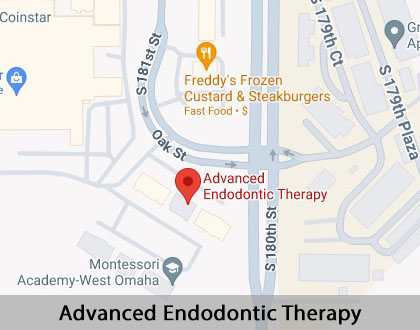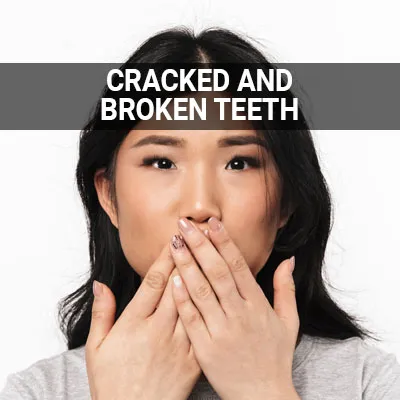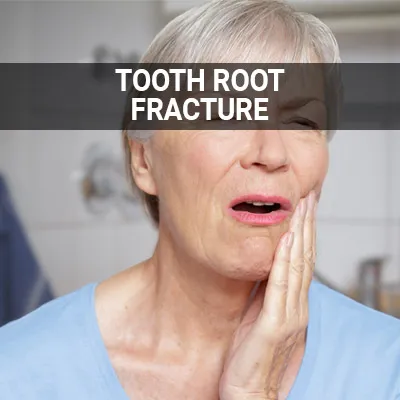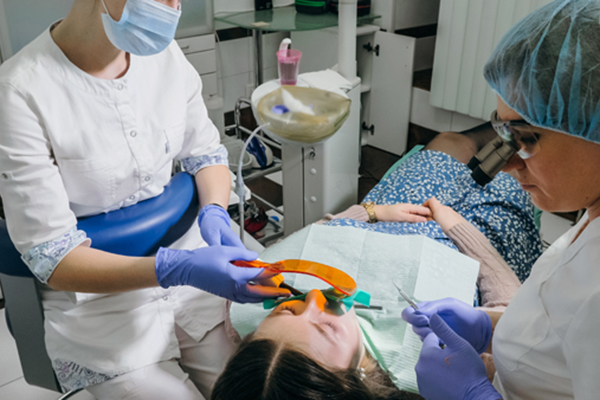Dental Trauma Treatment Omaha, NE
Dental trauma resulting from an accident or sports injury often requires emergency care, usually performed by a trained endodontist. An endodontist is a type of dentist with specialized training in treating problems that affect the inner part of the tooth and the root, such as a fractured or displaced tooth. It is important to treat traumatic dental injuries immediately to avoid damaging adjacent teeth or nearby structures and keep infection at bay.
If you experience severe dental trauma, let Advanced Endodontic Therapy in Omaha help you. Our team offers a variety of emergency endodontic services, including aftercare tips, so call us at (402) 403-6988 to learn more.
Endodontist Explained
An endodontist is a dentist that specializes in treating severe dental trauma. They are trained in treating complex injuries or dental emergencies that affect the soft interior tissues of the tooth. To become an endodontist, a dental student must complete an extra two years of advanced education on top of the standard four-year dental school curriculum. Endodontists are focused exclusively on treatments of the dental pulp – the soft tissue inside the tooth. They are skilled at diagnosing the source of oral or facial pain, which can elude normal dental examination.
“To become an endodontist, a dental student must complete an extra two years of advanced training.”
Endodontist Qualifications
Conventional dentistry primarily tends to problems affecting the tooth exterior, like filling cavities and placing sealants. Every endodontist is a dentist, but not all dentists are endodontists. An endodontist is specially trained to diagnose and treat problems of the tooth's interior. The word endodontics is derived from the Greek roots endo, meaning "inside," and odont, meaning "tooth." The damaged dental pulp is especially sensitive and requires a nuanced approach and pain management techniques that only an endodontist can perform.
“An endodontist is specially trained to diagnose and treat problems of the tooth’s interior.”
Traumatic Injuries
Dental traumas account for 5% of all bodily injuries and 17% of injuries in young children. Traumatic dental injuries can result from car or bicycle accidents, falls, physical fights, or contact sports. While injuries like a chipped tooth are relatively minor, an individual should seek emergency endodontic care if a tooth is knocked out or sustains a deep crack. Types of traumatic dental injuries treated by endodontists include:
- Avulsion, when a tooth is entirely knocked out
- Broken or fractured tooth, including a root fracture
- Concussion, damage to the ligaments holding a tooth in place
- Extrusion, a tooth that is displaced out of its socket and appears elongated
- Intrusive luxation, a tooth that is pushed into the gum
- Lateral luxation, a tooth that is pulled forward or pushed back
- Subluxation, loosening of the tooth without fracture or displacement
“Traumatic dental injuries can result from car or bicycle accidents, falls, physical fights, or contact sports.”
Check out what others are saying about our dental services on Yelp: Dental Trauma Treatment in Omaha, NE
Dental Trauma Aftercare
Emergency endodontic treatment often requires two or more procedures, like a root canal followed by crown placement. Because of this, it is especially important to follow specific endodontic aftercare instructions so that the person does not suffer additional damage or infection. Typical instructions include avoiding hard or chewy foods, as well as overly hot or cold liquids and foods. It is important to keep the mouth clear of infection using a lukewarm saltwater rinse. Good oral hygiene is also recommended to preserve the natural teeth and maintain any protective restoration.
“…it is especially important to follow specific endodontic aftercare instructions so that they do not suffer additional damage or invite infection.”
Questions Answered on This Page
Q. How is an endodontist different from a dentist?
Q. What are types of dental trauma?
Q. Why is aftercare important following dental trauma?
Q. Why should I look for an endodontist?
People Also Ask
Q. How can I tell if I have a cracked or broken tooth?
Q. What should a person do if a tooth is knocked out?
Q. What are the different types of tooth root fractures?
Q. What happens when an abscessed tooth goes untreated?
Find an Endodontist Before Dental Trauma Arises
If someone regularly participates in contact sports or has active school-aged children, there is a distinct possibility that they may have to deal with some type of dental trauma. Therefore, it is a good idea to have an endodontist picked out before an accident leaves them desperate for emergency dental care. An endodontist is the best choice in an emergency as their primary goal is to preserve the natural teeth.
When selecting an endodontist, an individual may ask their dentist for a referral. Make sure to ask if they provide emergency services and about their approach to pain management. Cost, convenience, experience, and office environment are additional considerations. However, availability and pain-relief practices are usually top priorities in a trauma situation.
“An endodontist is the best choice in an emergency as their primary goal is to preserve the natural teeth.”
Frequently Asked Questions
Q. What should I do if I experience dental trauma?
A. If you experience dental trauma, your best bet is to seek care from an endodontist. An endodontist specializes in treating injuries that affect the tooth interior. They are also skilled in managing related tooth pain.
Q. How can an endodontist help in an emergency?
A. An endodontist is specially qualified for treating severe dental injuries. The main goal of endodontics is to preserve the natural tooth by removing the damaged interior tissue while protecting the exterior structure. In addition, endodontists are trained in pain management techniques.
Q. When should I see an endodontist?
A. See an endodontist immediately if you experience any of these types of injury:
- Avulsion
- Broken or fractured tooth
- Concussion
- Extrusion
- Intrusive luxation
- Lateral luxation
- Subluxation
Q. What happens after a dental emergency?
A. Following dental trauma, teeth remain vulnerable. Be sure to avoid hard or chewy foods and items that are overly hot or cold. Keep your mouth clean with salt water rinses and maintain good oral health. Because treatment often requires multiple steps, continue aftercare practices between steps.
Q. How can I find a good endodontist?
A. If you are researching a good endodontist, be sure to ask about emergency services and how they approach pain management; ask your dentist if they can provide a referral. Friends, family, and co-workers are also excellent resources. It is wise to do an internet search of local endodontists in your area and read their online reviews.
Start Feeling Better – Visit Us Today
By visiting us as soon as possible, our team can help get you the professional treatment you need. Instead of waiting around and allowing the symptoms to get worse, we can provide you with treatment options.
Definitions
Call Us Today
If someone experiences a traumatic dental injury, seeking an experienced endodontist for emergency care is crucial. Because endodontic treatments require multi-step procedures, recovery and aftercare are particularly important to prevent further damage or stop infection. Choose an endodontist that you can rely on in emergencies, especially if you or your family members are regularly involved in high-risk activities like contact sports.
If you are in search of an endodontist in Omaha, let Advanced Endodontic Therapy help. Call us at 402-403-6988 to learn more about our services and policies.
Helpful Related Links
- American Academy of Family Physicians. Oral and Dental Injury Prevention in Children and Adolescents. 2024
- American Assosciation of Endodontists (AAE). Endodontic Emergencies. 2024
- AO Foundation. Various treatment options for tooth luxation. 2024
- Cleveland Clinic. Fractured Tooth (Cracked Tooth). 2024
- Journal of Multidisciplinary Care. Treating Dental Trauma. 2024
- Mayo Clinic. Taking it on the chin: How to manage dental trauma. 2024
- National Library of Medicine. Traumatic Dental Injuries, Treatment, and Complications in Children and Adolescents: A Register-Based Study. 2024
- WebMD. Handling Dental Emergencies. 2024
About our business and website security
- Advanced Endodontic Therapy was established in 2008.
- We accept the following payment methods: Cash, Discover, MasterCard, and Visa
- We serve patients from the following counties: Douglas County, Dodge County, Lancaster County, and Sarpy County
- We serve patients from the following cities: Omaha, Benson, Florence, Bellevue, Fort Calhoun, Papillion, Lincoln, Bennington, Plattsmouth, Fremont and Elkhorn, Missouri Valley, and Council Bluffs
- Norton Safe Web. View Details
- Trend Micro Site Safety Center. View Details
Back to top of Dental Trauma Treatment










